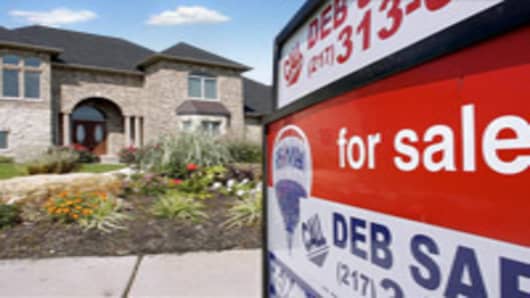Recent increases in housing prices are encouraging signs that the market is rebounding, but there remains a strong level of caution about whether the recovery is real.
The Standard & Poor's/Case Shiller composite indexes show housing price increases for both May and June. The gains are part of a positive second-quarter story that showed prices 2.9 percent higher than the first quarter, which hasn't happened since the housing crisis began three years ago.
That was welcome news for an industry that has seen prices shatter since the subprime mortgage market collapse and the ensuing credit crisis.
"It's an impressive turnaround. This is a huge sudden, upward swing," Robert Shiller, a Yale economist who helped develop the Case Shiller index, told CNBC in a live interview. "I think it might represent a change in trend."
The news comes on the heels of a report Friday showing existing home sales rising for the fourth month in a row to the highest level in two years.
But analysts say much of the increase in both sales and price is coming from foreclosures. Until that damage is cleared out, the housing market will be unable to declare a clear-cut victory.
"The only doubts about it are the market is rather abnormal now with all these foreclosure sales," Shiller said. "But the outlook is certainly changed with this data."
The level to which both foreclosures and another resetting of adjustable-rate mortgages in 2010 will affect the markets is still a worry. Foreclosures are up about 15 percent from 2008.
Moreover, the housing market in previous slumps has shown temporary price gains before slipping again.
Keeping interest rates low will be critical to preventing that from happening again this time around, said David Blitzer, S&P 500 Index Committee chairman. Blitzer said the onus will be on Federal Reserve Chairman Ben Bernanke, who was nominated Tuesday for a second term by President Obama.
"What will Ben Bernanke do over the next 12, 18 months? That's a huge question," he said. "If the exit strategy starts to exit too soon, all bets may be off."
There are other concerns as well.
Lending remains relatively tight, barring the door for many new home buyers who lack large down payments or stellar credit history. Unemployment continues to rise, and consumer weakness remains prevalent in the economy.
Few, then, are projecting a robust housing recovery even as the market gradually improves.
"To be sure, a single increase after 37 months of decline is hardly definitive, but the moderation in the downtrend has been developing gradually in recent months and this month's increase decidedly bolsters the argument that the housing recession has ended," David Resler, chief economist at Nomura Securities International in New York, wrote in a research note.
"However, with the job market still very weak and the imperative of household balance sheet restructuring, the recovery of this sector is likely to be much more gradual than after previous recessions."
The recovery is expected to be spotty geographically, with the areas hardest hit the slowest to recover, said Peter Cardillo, chief market economist at Avalon Partners in New York.
"The housing market came off a depression level. It's going to take some time. There are some major hurdles out there," Cardillo said. "Today's news is good news and one more piece of evidence that the depression in the housing market is starting to lift."



